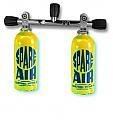Real tech divers use the Spare Air doubles.

Brilliant ha ha
Welcome to ScubaBoard, the world's largest scuba diving community. Registration is not required to read the forums, but we encourage you to join. Joining has its benefits and enables you to participate in the discussions.
Benefits of registering include
Real tech divers use the Spare Air doubles.

I've recently purchased the larger Spare Air bottle. As a new diver, I like the idea of
having an alternate air source available to use within a very short period of time.
I understand that at 60 ft. or more it is a limited amount of gas, however it is better
than chasing after a dive buddy while OOA. Does anybody also dive with Spare Air?
Raises several questions:
1) An instructor who has insufficient gas management skills and situational awareness to ensure that he doesn't run OOA on a shallow dive. Really?
2) An instructor who is not confident to perform a CESA (basic OW skill) from 40ft. Really?
3) An instructor who is not confident of sourcing, securing and breathing from their buddies' AAS (basic OW skill) in good conditions and shallow water. Really?
(or) An instructor who is solo diving, without proper training (gas management/solo skills) or equipment (fully redundant gas supply). Really?
I agree that good buddy skills are very important and you really shouldn't find yourself OOA and your buddy is too far away. Having said that, there is nothing wrong with having a Spare Air with you in case of an emergency if that's what you want. It's my understanding it was designed to be used in an emergency where a few more breaths of air could make a real difference. It serves that purpose.
As much as folks will come on this thread and bash the concept of the Spare Air, given a choice of being at depth in an OOA situation and either having a Spare Air or not, they'd gladly take the Spare Air.
Raises several questions:
1) An instructor who has insufficient gas management skills and situational awareness to ensure that he doesn't run OOA on a shallow dive. Really?
2) An instructor who is not confident to perform a CESA (basic OW skill) from 40ft. Really?
3) An instructor who is not confident of sourcing, securing and breathing from their buddies' AAS (basic OW skill) in good conditions and shallow water. Really?
(or) An instructor who is solo diving, without proper training (gas management/solo skills) or equipment (fully redundant gas supply). Really?
Another pet peeve of mine in these forums (as long as I am taking the time to write) are phrases like "ultimately, it's up to you, it's a personal choice". This implies that all approaches are equally valid, and that no external input, data analysis, etc.. should bear on them. Of course everything we do in diving and life is a personal choice, but the point of asking for advice is that we want to make good choices based on solid reasoning
Finally - they don't really sell a Nitrox model, do they? Is that so you can get an extra few seconds of bottom time before your emergency ascent?
(actually) An instructor who is using a tried and true sales tool to maximize store profits.

